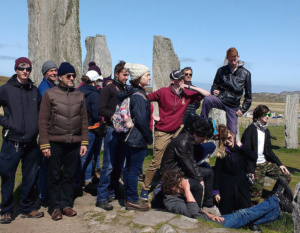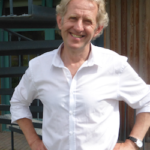by Chris Burn
It is 3.00 pm on a grey November afternoon. I am due to talk about my book ‘Poetry Changes Lives’ to the upper school at Drumduan School, Forres on the Moray Firth in Scotland, and the technology has developed a glitch.
I have to ad-lib. I talk a bit about my own background and my discovery of poetry and the students listen politely. Then the technology fires up and I show them a poem written by an American student wounded in a high school shooting where several of her classmates died.

Now I have their full attention. I talk about the way poetry is used to help victims of various traumas to express their feelings – how it helps them to ‘give it a place’. Several nod in agreement. Then I talk about how poetry can help people who are just inarticulate naturally or even people who are simply achingly bored and negative. They can relate to this too.
After the talk is finished, one 15 year old (who suffered a physical trauma recently) wants to show me a poem she has written and several others ask questions. These are young people who appear to relish learning. Not one of them looked bored or resentful at being there during my session (this has never happened in my talks before!).
The next day I do a creative writing workshop with ten students. The tables are arranged in a circle and every student participates fully. They are cheerful and laugh a lot but they are also extremely insightful and work diligently on the assignments I give them – an exercise on writing without adjectives, a haiku, a short prose assignment and a collective poem (where each student writes a line). Some of their work is beautifully original – they clearly relish using their imaginations. They are a happy group and are not judgemental or competitive; instead they help each other spontaneously in little ways and have an easygoing relationship with each other and with me as well. The time passes quickly because I am enjoying it.
The school is run on principles suggested by Rudolf Steiner in the early Twentieth Century. I understand these to be, put simply, a balance between the artistic (emotional), the practical (physical) and the academic (mental) capacities; the heart, the hands and the head. Through these, students acquire a love of learning that comes not from competitiveness or learning by rote but from critical reasoning and the satisfaction of understanding. Exams and tests do not happen; instead each student compiles a detailed portfolio of their work, which bears witness to their scholarship and development in a different way.

There are Steiner Schools that embrace similar principles, in Edinburgh, Glasgow and throughout the UK and indeed many world countries (often called Waldorf -Steiner Schools).
The school ethos, explained to me by Principal Teacher Krzysztof Zajaczkowski, is: ‘..to inspire life-long learning, to awaken hidden potential, to facilitate right action in the world, to develop free thinking through thoughtful debate, to guide hands in the transformation of materials into beautiful and life enhancing products……..to help the young person meet the emergent future.’
I am no expert educationalist but I am impressed by this school. I remember my own schooling as ‘the best of times and the worst of times’ and overall I cannot recall it as a happy experience, but my feeling as I left Drumduan was that for most, if not all of its students, it would be remembered as very much that – a happy experience. And a lot more as well.











Inspiring article. Hopefully this is the way that schools will be in the future. The competitive way they are currently run are so destructive to the confidence and souls of millions of kids today.